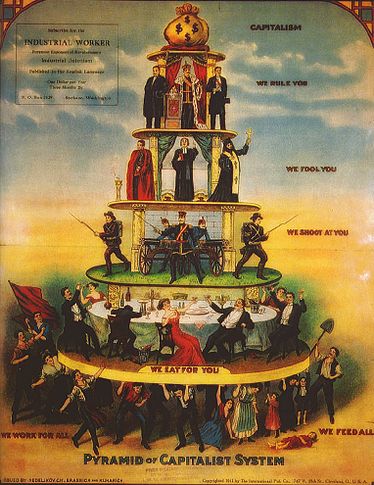Account of historical change given by German social theorist Karl Marx (1818-1883). The principle division within society is between classes. Classes are groups defined in terms of their relationship to the means of production. They have conflicting interests, and this conflict is the basis of political competition. Class struggle therefore – rather than pursuit of the national interest, or ideological difference – is the motor of history.
Definition
Class struggle happens when the bourgeoisie (the rich) pay the proletariat (the workers) to make things for them to sell. The workers have no say in their pay or what things they make, since they cannot live without a job or money.
Karl Marx saw that the workers had to work without any say in the business. He believed that since the workers make the things, they should say where they go and for how much, instead of the rich owners. They had to work hard to earn a living, while making the rich richer just doing simple office work.
Since they had to earn money to buy food, and jobs were the only things that give money, they had no choice but to work for the rich who made the business. The rich became richer while the worker hauled and lifted and did all of that hard manual stuff no one really likes to do.
Karl Marx thought that their labor limited their freedom. He wanted the workers to unite and take over the business, so that they could all be prosperous. He thought that the common man deserved to run the business, and that the rich were not better than the commoner.

Forms
Class struggle appeared in some forms. First, there is an economic form. The proletariat struggle with the bourgeoisie through their laborer’s organization in this form. Second, there is a political form. In this form, the proletariat has their party and, through democracy, they try to change the system. And the last, there is an ideological struggle. In this form, the proletariat try to adapt the old governing system to new social situations. There are other forms of struggle, too. These forms are not exclusive, but exist at the same time.
History
Class struggle appeared all throughout history. At first, people lived in small communist societies. Then, they took property from the Earth for themselves and started to use slaves. They then had feudalism, which meant one person owned an entire area of land and used soldiers and workers to help them make money, and only gave their workers land, but they had some freedom that slaves didn’t. Finally, in Karl Marx’s time, people in some countries were becoming workers and bosses during the industrial revolution. The bosses owned the machines that the workers used to make things, but they didn’t help using the machines. Instead, they made money by buying the time and energy of the workers to make things. Marx believed that the workers were not making as much money as they deserved because the boss would make money from the work they did without helping.
The future
Marx believed that countries would overthrow capitalism and that workplaces would move toward socialism. This roughly means that the workers would control the workplaces. When this would have happened everywhere, Marx thought the world will have achieved communism.
The Soviet Union overthrew feudalism. They never reached the point of capitalism, so their society was very corrupt. Many blame them for the bad name of communism. There are some workplaces and societies are run democratically by workers, such as the kibbutzim in Israel.
Present day
Social democrats and liberal conservatives do not see society as described by Marx. They see society as changing gradually, through the system of democratic voting. The European Union is composed almost entirely of countries governed by this kind of system, but it is not universal throughout the world. Very few countries have undergone the kind of revolution forecast by Marx. It is much more common for military leaders to seize power and enforce a dictatorship which is neither democratic nor revolutionary.
Source: David McLennan, The Thought of Karl Marx (London, 1981)

Pretty nice post. I just stumbled upon your blog and wanted to say that I’ve truly enjoyed surfing around your blog posts. In any case I’ll be subscribing to your feed and I hope you write again soon!
Hi my family member! I wish to say that this article is awesome, great written and include almost all vital infos. I’d like to look more posts like this .
Excellent post. I was checking continuously this blog and I am impressed!
Extremely helpful info specially the last part
I care for
such information much. I was looking
for this certain info for
a long time. Thank you and good luck.
Your way of explaining the whole thing in this paragraph isactually fastidious, ever one be ablke to without difficulty knowit, Thanks a lot.